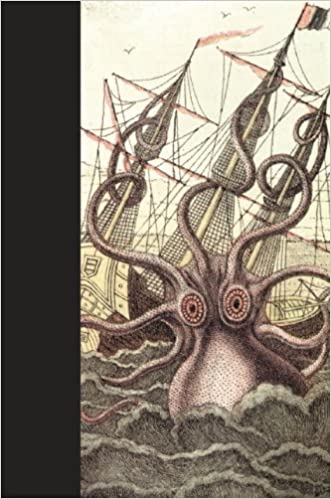 By E.H. VISIAK (Centipede Press; 1929/2010)
By E.H. VISIAK (Centipede Press; 1929/2010)
E.H. Visiak’s MEDUSA is one of the rarest and most sought-after horror novels of all time (take it from one who spent years searching for it). This profusely illustrated limited edition 2010 hardcover (which is already a collector’s item) was promoted as the definitive edition of this “neglected masterpiece,” featuring a newly written introduction by Colin Wilson and 12 short stories and a nonfiction piece by Visiak. I’ll accept that this is indeed the “definitive” edition of MEDUSA—it’s certainly superior to the musty 1929 hardcover with which I previously made due—although I’m not convinced the “masterpiece” label is warranted.
Nonetheless, this “Story of Mystery and Ecstasy and Strange Horror” is a fascinating and altogether unique account of sea-bound terror. E.H. Visiak was a close friend of the brilliant David Lindsay, as well as a renowned authority on the works of John Milton and Joseph Conrad. All three influences are evident in MEDUSA, with Lindsay’s peculiar brand of metaphysical horror colliding with a very Miltonian sense of poetic religiosity, all set against a gritty portrayal of life at sea that directly recalls Conrad. A fourth influence would seem to be H.P. Lovecraft, although this novel is a far cry from the pulpy Weird Tales style.
Visiak’s lofty intentions are evident in the highly refined, Milton-esque prose, which is anything but an easy read. There’s also the fact that very little happens in the novel’s first half, involving a young boy who joins a ship manned by Huxtable, a middle-aged mariner in search of his missing son. The ensuing sea jaunt is none too eventful, although things pick up around the halfway point, with the discovery of a pirate ship containing a single inhabitant: a babbling madman.
A bit later a strange fish-like creature is discovered being harbored by one of the seamen. Turns out the creature is part of an ancient race of super-intelligent humans who created a transmitting machine that transformed them into scaly creatures and caused their land to sink into the sea (all this is related in the form of an “Indian legend” fortuitously recounted by Huxtable). Now it seems the critters subside by luring unsuspecting seamen to their lair, where a vast tentacled entity assails the men with ecstatic visions, thus making it easier for them to be devoured by the “medusa” (which Colon Wilson opines represents the destructive power of sexuality and, by extension, femininity). Such a fate does indeed befall Huxtable’s crew, and only those of high spiritual constitution survive the melee.
Such is MEDUSA. The 12 short stories that follow deal with similar concepts, with odd adventures in oceanic settings being a recurring motif. The best of the stories is “Medusan Madness,” a deeply hallucinatory account of a nightmarish confrontation with a madwoman that contains many MEDUSA-esque elements.
The book concludes with an essay called “The Significance of Horror Fiction,” in which Visiak once again invokes his favorite writers Milton and Conrad, together with Edgar Allan Poe and Sheridan Le Fanu, to argue that horror works best when presented as realistically as possible. Interesting.
